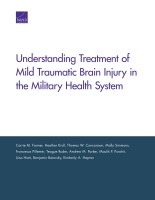| 来源类型 | Research Reports
|
| 规范类型 | 报告
|
| DOI | https://doi.org/10.7249/RR844
|
| ISBN | 9780833092762
|
| 来源ID | RR-844-OSD
|
| Understanding Treatment of Mild Traumatic Brain Injury in the Military Health System |
| Carrie M. Farmer; Heather Krull; Thomas W. Concannon; Molly Simmons; Francesca Pillemer; Teague Ruder; Andrew M. Parker; Maulik P. Purohit; Liisa Hiatt; Benjamin Saul Batorsky; et al.
|
| 发表日期 | 2016
|
| 出版年 | 2016
|
| 页码 | 146
|
| 语种 | 英语
|
| 结论 |
Understanding the Characteristics of Service Members with mTBI and Their Patterns of Treatment Can Inform the Delivery of High-Quality Care - Service members who received treatment for a new mTBI diagnosis in 2012 tended to be young and junior enlisted.
- Most service members appeared to recover quickly following their mTBI diagnosis, but a minority had complex and persistent care needs.
- Most service members with a new mTBI diagnosis were diagnosed in an emergency department and had their next health care visit in a primary care setting.
- Many service members with a new mTBI diagnosis also received treatment for co-occurring behavioral health conditions, pain, and sleep disorders.
- Service members with a new mTBI diagnosis received a variety of assessments and treatments, such as CT scans, physical therapy, and pain medication, in the six months following the mTBI diagnosis, but there were differences by whether the service member had experienced a prior TBI.
Variations in Diagnostic Coding and Other Data Limitations Pose Challenges to Identifying Service Members with mTBI and Profiling Their Care- Health care providers face confusing diagnostic coding guidelines and use inconsistent coding practices when diagnosing and treating TBI.
Variations in Diagnostic Coding and Other Data Limitations Pose Challenges to Identifying Service Members with mTBI and Profiling Their Care- Available data track the characteristics of service members and their care, but there is a critical need for data on clinical outcomes, patient satisfaction, and other factors that would provide a more complete picture of an episode of mTBI care and more specific guidance for improving the quality of care for service members with mTBI.
|
| 摘要 |
- Identify opportunities to coordinate care. Service members diagnosed with mTBI receive treatment in a variety of clinical settings — not just in military facilities. It is important for the Military Health System to understand the challenges and develop strategies for care coordination and to identify best practices.
- Assess the quality of care for service members with mTBI. Future research should extend these analyses, examining not only the type of care provided but also its quality. Given the variability in symptom presentation and recovery, the Military Health System should develop clearer standards of care for mTBI.
- Reconsider current TBI coding guidance. DoD TBI coding guidance requires that providers record a TBI diagnosis only at the first visit, with subsequent visits coded with relevant symptom diagnostic codes. As a result, it is not possible to use administrative data to observe treatment for mTBI over time. DoD should consider whether the advantages of the current coding guidance outweigh the disadvantages for understanding the nature of care provided to service members with all types of TBIs.
- Improve data quality to increase capacity for research. Improving connections between administrative claims and other clinical data (e.g., chart data, pharmacy data) would facilitate a wide range of research.
- Conduct further research on the conditions and care of service members with mTBI. This study was designed to establish a foundation for hypothesis-directed clinical studies. Future analyses should focus on care patterns and their predictors, variations in diagnoses and care, and the cohort with persistent mTBI-related problems.
|
| 主题 | Defense Health Agency
; Health Care Quality
; Military Veterans
; Traumatic Brain Injury
|
| URL | https://www.rand.org/pubs/research_reports/RR844.html
|
| 来源智库 | RAND Corporation (United States)
|
| 引用统计 |
|
| 资源类型 | 智库出版物
|
| 条目标识符 | http://119.78.100.153/handle/2XGU8XDN/108355
|
推荐引用方式
GB/T 7714 |
Carrie M. Farmer,Heather Krull,Thomas W. Concannon,et al. Understanding Treatment of Mild Traumatic Brain Injury in the Military Health System. 2016.
|
|
文件名:
|
x1495316338586.jpg
|
|
格式:
|
JPEG
|

|
文件名:
|
RAND_RR844.pdf
|
|
格式:
|
Adobe PDF
|
除非特别说明,本系统中所有内容都受版权保护,并保留所有权利。